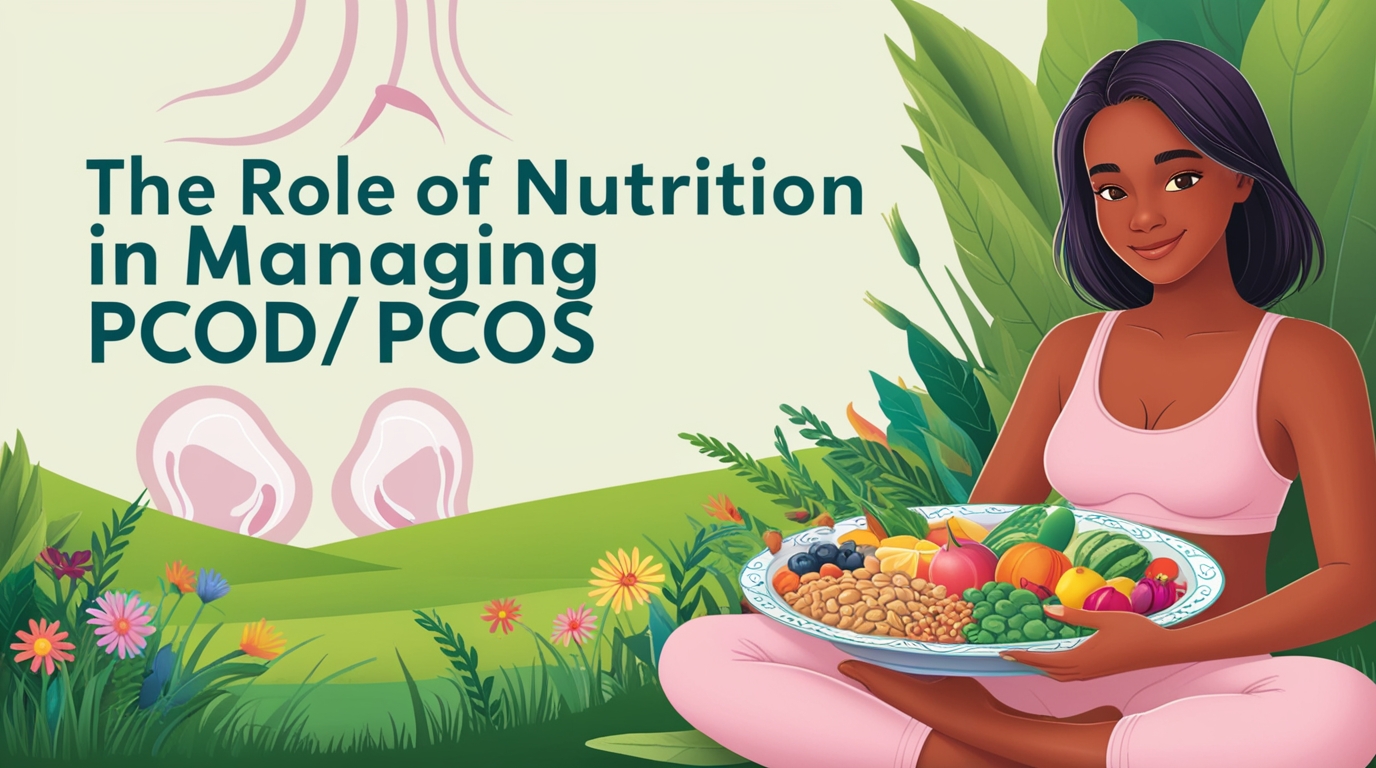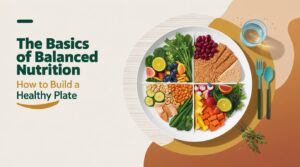Polycystic Ovarian Syndrome (PCOS) or Polycystic Ovarian Disorder (PCOD) is a common condition that affects many women, especially during their reproductive years. It causes hormonal imbalances, irregular periods, and other symptoms like weight gain, acne, and excessive hair growth. Managing PCOS can be challenging, but one of the most effective ways to control its symptoms is through proper nutrition.
In this blog, we will explore how nutrition can play a vital role in managing PCOS and improving your overall health.
Know more about nutritional diets and create yours now.
The Role
Understanding the Connection Between PCOS and Insulin
Insulin opposition is a common issue for women with PCOS. Insulin is a hormone that helps your body use sugar (glucose) for energy that keeps you going. However, when your body becomes resistant to insulin, it can’t use glucose properly, leading to higher insulin levels. This can cause weight gain, especially around the belly, and increase testosterone production, which worsens PCOS symptoms.
How Nutrition Helps:
A balanced diet can help improve insulin sensitivity, reduce weight, and manage the hormonal imbalances caused by PCOS. The right foods can help regulate blood sugar levels and improve your overall well-being.
Focus on a Low Glycemic Index (GI)
A low GI diet includes foods that are digested slowly, which helps to keep your blood sugar levels stable. This is especially important for women with PCOS because stable blood sugar levels help control insulin and hormone levels.
Low-GI Foods Include:
- Whole grains: Brown rice, oats, quinoa, and whole wheat bread.
- Vegetables: Broccoli, spinach, carrots, and leafy greens.
- Fruits: Apples, berries, and pears.
- Legumes: Lentils, beans, and chickpeas.
Eating these foods helps manage insulin levels and can reduce PCOS symptoms like acne and irregular periods.
Include Lean Proteins and Healthy Fats
A balanced diet for PCOS should also include enough lean proteins and healthy fats. Protein helps keep you full and satisfied, which can prevent overeating, while healthy fats support hormone production and reduce inflammation.
Sources of Lean Proteins:
- Chicken, turkey, fish, eggs, tofu, and beans.
Sources of Healthy Fats:
- Omega-3 fatty acids found in fatty fish like salmon and mackerel.
- Unsaturated fats like olive oil, avocados, and nuts.
By including these in your diet, you can help balance your hormones and improve symptoms like inflammation and irregular cycles.
Eat Plenty of Fiber-Rich Foods
Fiber is important for managing PCOS because it helps with digestion, keeps you full longer, and stabilizes blood sugar levels. Fiber also promotes heart health, which is essential since women with PCOS are at a higher risk of developing heart disease.
High-fiber Foods Include:
- Vegetables: Broccoli, spinach, Brussels sprouts.
- Fruits: Apples, berries, oranges.
- Whole grains: Oats, quinoa, brown rice.
- Legumes: Lentils, beans, chickpeas.
Eating more fiber helps control cravings, supports digestion, and can help manage your weight.
Reduce Inflammation with Anti-Inflammatory Foods
PCOS is often linked to inflammation, which can worsen symptoms. An anti-inflammatory diet can help reduce inflammation in the body and improve overall health.
Anti-Inflammatory Foods Include:
- Fatty fish: Salmon, sardines, and mackerel.
- Berries: Blueberries, strawberries, and raspberries.
- Leafy greens: Spinach, kale, and broccoli.
- Nuts and seeds: Walnuts, flaxseeds, and chia seeds.
- Turmeric and ginger: Known for their powerful anti-inflammatory properties.
Including these foods into your diet can help reduce inflammation, manage insulin levels, and improve PCOS symptoms like acne and hair growth.
Control Portion Sizes and Avoid Sugary Foods
Portion control is important for managing weight, especially for women with PCOS who may find it harder to lose weight due to insulin resistance. Eating large portions or too many sugary foods can lead to weight gain and worsen PCOS symptoms.
Tips for Portion Control:
- Start with smaller portions and only go for the second if you’re still hungry.
- Eat meals on smaller plates to avoid overeating.
- Combine protein, healthy fats, and fiber to keep you full and prevent cravings.
Avoid sugary foods like candies, pastries, sodas, and other high-sugar treats, as they can cause blood sugar spikes and worsen insulin resistance.
Stay Hydrated
Staying hydrated is often overlooked, but it’s an essential part of managing PCOS. Drinking enough water helps with digestion, reduces bloating, and can even help with weight management by controlling hunger.
Hydration Tips:
- Drink 8-10 glasses of water a day.
- Herbal teas or infused water (like lemon water) are great alternatives if you find plain water boring.
Staying hydrated can improve your overall health and make it easier to manage PCOS symptoms.
Exercise Regularly
While nutrition is key, physical activity is also an important part of managing PCOS. Regular exercise improves insulin sensitivity, supports weight loss, and boosts your mood. You don’t need to engage in intense workouts—simple activities like walking, yoga, or swimming can make a big difference.
Benefits of Exercise for PCOS:
- Helps regulate periods.
- Improves insulin resistance.
- Reduces stress and anxiety.
Foods to Avoid
Certain foods can worsen PCOS symptoms, so it’s best to limit them in your diet. These include:
- Sugary foods: Cakes, candies, and sodas.
- Refined carbohydrates: White bread, pasta, and pastries.
- Processed foods: Fast food and packaged snacks.
Avoiding these foods can help reduce insulin resistance, improve energy levels, and support overall health.
Conclusion
Nutrition plays a crucial role in managing PCOS/PCOD. By focusing on a balanced diet rich in whole grains, lean proteins, healthy fats, and fiber, you can help regulate your blood sugar, improve insulin sensitivity, and reduce inflammation. Making these small but effective changes can greatly improve your symptoms and overall quality of life.
If you’re dealing with PCOS, remember that everyone’s body is different, and it’s important to work with a healthcare professional or a dietitian to find the best approach for your unique needs. Start making mindful, healthy choices today, and you’ll see the benefits over time!





